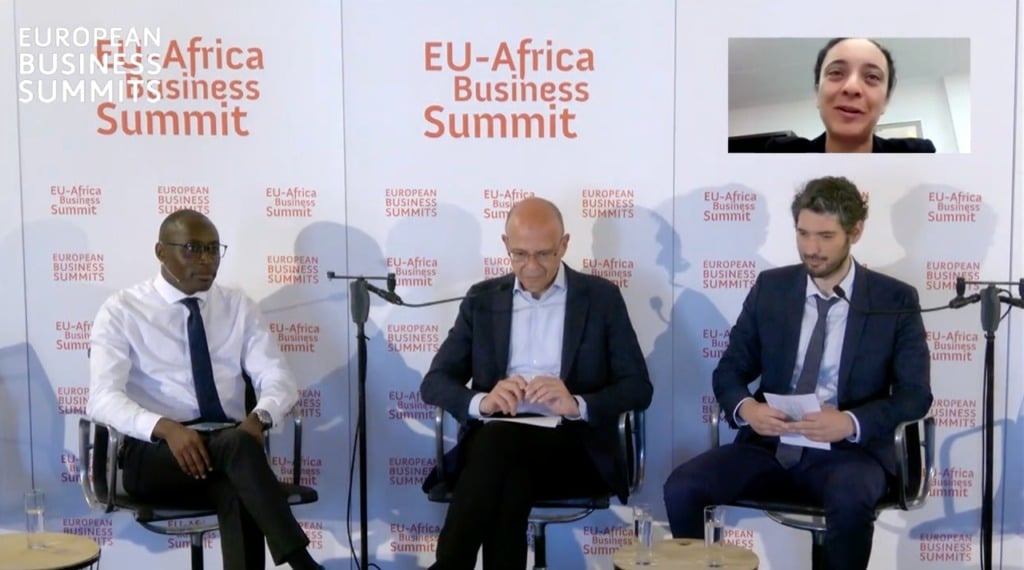This article was produced with the support of OCP
Taking part in the panel session dedicated to “EU-AFRICA FOOD SECURITY CRISIS TIME: TOWARDS A RENEWED PARTNERSHIP”, Iliass El Fali , Advisor to OCP’s Chairman & CEO and former COO OCP Group, has exposed OCP’s vision in the optic of collaborative and transversal approach with all the stakeholders acting on the farmer’s ecosystem, to elaborate sustainable and specific solutions and build common solutions at European and African level to ensure food security in the coming decades.
In this sense, Iliass El Fali has insisted on the strong need for more collaboration, developing R&D exchanges on both continents and coalitions among private players to push even further research and innovation to transform the agricultural sector and meet the short term pressing needs. Besides, he recalled the importance of fertilisers in the food value chain, since beyond its contribution to ensuring food security, proper use of fertilisers protect and improve the soil health. “The role of fertilisers in food production: without fertilisers the production will be reduced by 50%. Phosphorus is essential to preserve and improve soil health. It contributes to mitigate climate change by capturing carbon and enhance the fixation of micronutrients.”
The round table objective was to deepen discussions on the future of global food supply and food security in the current geopolitical context. With the world’s population projected to increase to 10 billion by 2050, food production should remain high on the international agenda’s unquestionable concerns. Strengthening partnerships and sharing best practices on sustainable agriculture is the key to ensure the achievement of SDGs 2: zero hunger, 10: reduced inequalities and 11: building sustainable cities and communities in both continents, as well as the objectives of the Global Gateway strategy.
Several political and economic African and European actors have also taken part in the round table among which Jérémy Decerle, Member of the European Parliament, Member of the Committee on Agriculture and Rural Development; Willi Schulz-Greve, Head of Unit, Global Issues, WTO & relations with ACP, DG AGRI; Godfrey Bahiigwa, Director for Agriculture and Rural Development, African Union Commission and Daniel Azevedo, Director of Commodities, Trade and Technology, Copa Cogeca.

A strengthened cooperation over energy is also of utmost importance in Africa-Europe relations not only to improve access to energy, but also to ensure valid education, healthcare, and social infrastructures. The diversification of energy supplies implies new approaches and paths of collaboration between policymakers and the private sector. Moreover, strengthening the energy market is one of the main objectives of the EU Global Gateway’s Investment Package for Africa, aiming at making the two continents equal partners.
This topic was discussed within the session “DIVERSIFYING THE ENERGY SUPPLY FOR A RESILIENT INTERNATIONAL ENERGY MARKET: FOCUSING ON THE ROLE OF HYDROGEN” among which business representatives from different sectors interacted to explore innovative ideas minimising threats to the environment.
Taking part to this panel, Hanane Mourchid Executive Director Sustainability & Green Industrial Development, OCP Grouphas exposed how OCP as a responsible company is committed to produce its fertilisers in the most sustainable manner and how in the current global context which is increasingly sensitive to the issue of climate change, green hydrogen is considered an essential lever for decarbonising the entire industry value chain starting with electricity production. “The plan on green industrialisation should first and foremost consider the importance of strengthening Africa’s electrification. Many African countries have undeniable natural assets for renewable energies, a potential lever for a just transition“.
Building a hydrogen economy through the creation of an international market would benefit the international community and unlock business opportunities for energy intensive industries.

 Sign in with Google
Sign in with Google 





